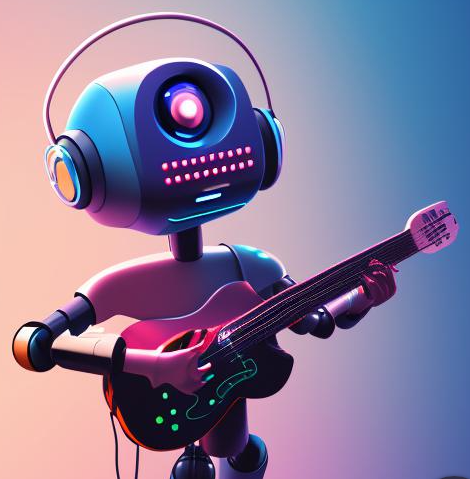Music has always been a powerful form of expression and creativity. With recent advancements in artificial intelligence, there has been a growing interest in using AI models to generate music. One such remarkable model is MusicGen, developed by META's Audiocraft team at Facebook. MusicGen is a simple and controllable model that pushes the boundaries of music generation. In this blog post, we will explore the features, capabilities, and applications of MusicGen.
Introducing MusicGen
MusicGen is an auto-regressive Transformer model designed for music generation. It utilizes a single-stage architecture and operates on a 32kHz EnCodec tokenizer with 4 codebooks sampled at 50 Hz. What sets MusicGen apart from existing methods like MusicLM is that it doesn't require a self-supervised semantic representation. Additionally, MusicGen generates all 4 codebooks in one pass, optimizing the process for efficiency. By introducing a small delay between the codebooks, MusicGen predicts them in parallel, resulting in only 50 auto-regressive steps per second of audio.
The development of MusicGen was driven by a research paper titled "Simple and Controllable Music Generation" authored by Jade Copet, Felix Kreuk, Itai Gat, Tal Remez, David Kant, Gabriel Synnaeve, Yossi Adi, and Alexandre Défossez.
Model Variants and Checkpoints
MusicGen is available in different sizes and variants to suit various requirements. The three available sizes are:
- Small: A model with 300 million parameters.
- Medium: A model with 1.5 billion parameters.
- Large: The largest variant with 3.3 billion parameters.
In addition to size, MusicGen comes in two distinct flavors:
- Text-to-Music Generation: A model trained to generate music based on textual descriptions.
- Melody-Guided Music Generation: A model trained to generate music guided by melodic inputs.
These variations provide flexibility and cater to different use cases and research scenarios.
Getting Started with MusicGen
To facilitate exploration and usage of MusicGen, the Audiocraft team has released four checkpoints:
- Small
- Medium
- Large (the checkpoint discussed here)
- Melody
To try out MusicGen, you can utilize the provided Colab notebook or HuggingFace library. Alternatively, you can run the code locally by installing the Audiocraft library and ensuring ffmpeg is installed. The Python code snippet shared below demonstrates how to generate music using MusicGen:
import torchaudiofrom audiocraft.models import MusicGenfrom audiocraft.data.audio import audio_write
model = MusicGen.get_pretrained('large')model.set_generation_params(duration=8) # generate 8 seconds.
descriptions = ['happy rock', 'energetic EDM', 'sad jazz']
wav = model.generate(descriptions) # generates 3 samples.
for idx, one_wav in enumerate(wav): # Will save under {idx}.wav, with loudness normalization at -14 db LUFS. audio_write(f'{idx}', one_wav.cpu(), model.sample_rate, strategy="loudness")
The provided example demonstrates generating three music samples based on the textual descriptions 'happy rock,' 'energetic EDM,' and 'sad jazz.' The resulting audio files are saved for further analysis or enjoyment.
Model Details and Development
The MusicGen model is developed by the FAIR (Facebook AI Research) team at Meta AI. The training of MusicGen took place between April 2023 and May 2023, resulting in the version 1 release of the model. With a strong foundation in the Transformer architecture, MusicGen leverages its capabilities to model music sequences effectively.
For more detailed information on the model, its architecture, and training methodology, refer to the research paper titled "Simple and Controllable Music Generation." The paper provides valuable insights into the technical aspects of MusicGen and serves as a comprehensive resource for those interested in diving deeper into the topic.
Intended Use and User Base
MusicGen primarily serves as a tool for research in AI-based music generation. It caters to the following use cases:
Research Efforts: MusicGen enables researchers to probe and better understand the limitations of generative models, driving advancements in the field of AI-generated music.
Text or Melody-Guided Music Generation: MusicGen allows machine learning enthusiasts and amateurs to experiment with generating music based on textual descriptions or melodic inputs, helping them comprehend the current abilities of generative AI models.
The primary users of MusicGen are researchers in the domains of audio, machine learning, and artificial intelligence. Additionally, individuals seeking to gain a better understanding of these models and their capabilities will find value in exploring MusicGen.
Real World Applications
-
Music Composition and Production: MusicGen can serve as a valuable tool for composers and music producers. It can be used to generate musical ideas, explore different genres, and even assist in the composition process by providing inspiration and creative input.
-
Soundtracks for Media: MusicGen can be employed to generate original soundtracks for various forms of media, such as films, video games, advertisements, and podcasts. It enables content creators to have access to a vast library of AI-generated music that can be tailored to their specific needs.
-
Personalized Music Recommendations: MusicGen can enhance personalized music recommendations by generating music that aligns with users' preferences and moods. It enables music streaming platforms to offer unique and tailored playlists to their users, enhancing the overall music discovery experience.
-
Educational and Research Purposes: MusicGen can be utilized in educational settings to teach music theory, composition techniques, and the fundamentals of music production. Researchers can also use MusicGen to study and analyze AI-generated music, exploring its artistic and technical aspects.
-
Interactive Experiences and Gaming: MusicGen can contribute to the development of interactive experiences and gaming applications. By generating dynamic and adaptive music in real-time, it enhances the immersive nature of virtual reality (VR) experiences and enriches the gameplay in video games.
-
AI-assisted Music Collaboration: MusicGen can facilitate collaborative music creation by providing AI-generated musical ideas that artists can build upon. It offers a unique way for musicians and producers to explore new directions and styles in their collaborative endeavors.
-
AI-generated Background Music: MusicGen can generate background music for various settings, such as restaurants, retail stores, and public spaces. It provides an automated and customizable solution for creating ambient music that enhances the atmosphere and overall experience of these environments.
It's important to note that while MusicGen presents exciting opportunities in these applications, it should always be used responsibly and with consideration for the ethical implications surrounding AI-generated content.
Limitations, Biases, and Ethical Considerations
Like any AI model, MusicGen has certain limitations and biases that should be taken into account. Understanding these factors is crucial to ensure responsible and ethical use of the model. Here are some key points to consider:
Limitations:
- MusicGen does not generate realistic vocals.
- The model has been trained primarily with English descriptions, potentially leading to a reduced performance with other languages.
- Performance may vary across different music styles and cultures.
- The model occasionally generates the end of songs, resulting in abrupt transitions to silence.
- Obtaining desired results may require prompt engineering and experimentation with text descriptions.
Biases:
- The training data used for MusicGen may lack diversity, potentially leading to biased output.
- Representations of all music cultures may not be equally captured in the dataset, affecting the model's performance across different genres.
- The generated samples reflect the biases present in the training data.
Risks and Harms:
MusicGen has the potential to generate biased, inappropriate, or offensive content. It is crucial for users to be aware of these risks and mitigate them appropriately. The model's code is released under the MIT license, while the model weights are released under CC-BY-NC 4.0.
Evaluation and Metrics
To assess the performance of MusicGen, several metrics and evaluation methodologies have been employed:
- Objective Measures: The model's performance was evaluated using the Frechet Audio Distance, Kullback-Leibler Divergence, and CLAP Score computed on features and distributions extracted from pre-trained audio classifiers.
- Qualitative Studies: Human participants were involved in qualitative studies to evaluate the overall quality of the generated music samples, relevance to the provided text input, and adherence to the melody for melody-guided music generation. The human studies provided valuable insights into the model's performance from a subjective standpoint.
For a more comprehensive understanding of the performance measures and human studies conducted, refer to the research paper.
Conclusion
MusicGen, developed by META's Audiocraft team, represents a significant advancement in the field of AI-based music generation. With its simple yet powerful auto-regressive Transformer architecture, MusicGen provides researchers and enthusiasts with a controllable model for generating music. By understanding the model's limitations, biases, and ethical considerations, users can leverage MusicGen responsibly to further explore and expand the boundaries of AI-generated music.
The release of MusicGen checkpoints, along with the accompanying code and resources, allows the AI community to engage with the model, conduct research, and contribute to its development.







Leave a Comment
No Comments Yet